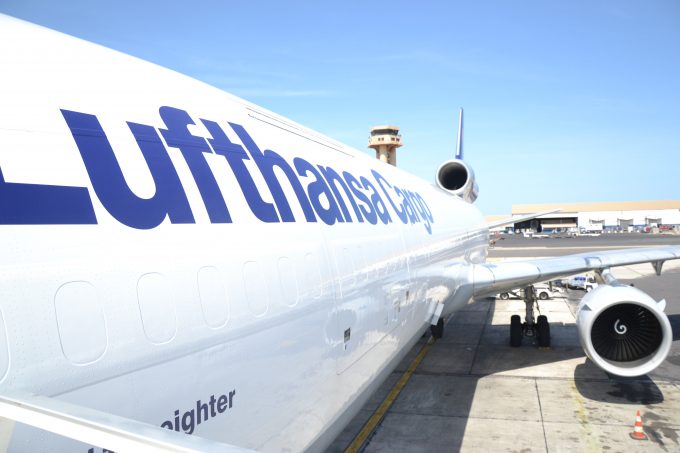News in Brief Podcast | Week 49 | Tariffs, rates – and Russian suspicions
In this jam-packed episode of The Loadstar’s News in Brief Podcast, host and news reporter ...
FDX: ABOUT USPS PRIVATISATIONFDX: CCO VIEWFDX: LOWER GUIDANCE FDX: DISRUPTING AIR FREIGHTFDX: FOCUS ON KEY VERTICALFDX: LTL OUTLOOKGXO: NEW LOW LINE: NEW LOW FDX: INDUSTRIAL WOESFDX: HEALTH CHECKFDX: TRADING UPDATEWMT: GREEN WOESFDX: FREIGHT BREAK-UPFDX: WAITING FOR THE SPINHON: BREAK-UP ALLUREDSV: BREACHING SUPPORTVW: BOLT-ON DEALAMZN: TOP PICK
FDX: ABOUT USPS PRIVATISATIONFDX: CCO VIEWFDX: LOWER GUIDANCE FDX: DISRUPTING AIR FREIGHTFDX: FOCUS ON KEY VERTICALFDX: LTL OUTLOOKGXO: NEW LOW LINE: NEW LOW FDX: INDUSTRIAL WOESFDX: HEALTH CHECKFDX: TRADING UPDATEWMT: GREEN WOESFDX: FREIGHT BREAK-UPFDX: WAITING FOR THE SPINHON: BREAK-UP ALLUREDSV: BREACHING SUPPORTVW: BOLT-ON DEALAMZN: TOP PICK

Lufthansa Cargo is betting on capacity and technology to cement its position as an air cargo leader – but it must adopt a mindset change.
The carrier believes more pricing transparency and better–connected technology for its customers will be essential to its success.
“The next step for us is opening up our platforms, through APIs, so anyone can get our content,” explained chief commercial officer Dorothea von Boxberg.
“If forwarders want our inventory in their system, they can have it.”
The carrier is offering two new interfaces for customers, GetCapacity and GetRates, which allows customers to add the data into their system, giving them real-time information.
But there are other important tenets to digitisation, added Ms von Boxberg (pictured below).
“We can learn new business models from start-ups,” she said.
One of the difficulties is the change in processes for an older company such as Lufthansa, she explained.
“We have to look at the culture, and how we get digital-ready. It means changing roles in sales, in our headquarters.
“It’s a big change in our organisation. But it feels as if that change is accelerating, people are getting used to it. Are we up to 100%? Not yet.”
Alongside the mindset change challenge is the question of how to progress digitally.
“What do we build ourselves; what do we buy?” she added. “On the sales side, it is not so difficult. You offer when something can be delivered, and at what price. Everything can be Googled – except the price of air freight.
“It’s so easy in many industries, and in the passenger sector. Start-ups have been helpful because they have the mentality that ‘it can be done’.”
But alongside the cultural and financial investment in technology, is the investment in assets.
Statistics revealed by Seabury at the WCS event in Singapore this month showed how much the freighter operator market has changed in recent years. In 2002, calculated by international freight tonne kilometres, Lufthansa was the top cargo carrier, followed by Singapore, Korean and Air France.
The Middle East then began to shift the market and, by 2010, Lufthansa had slipped to fourth, after AF-KLM, Cathay and Korean – with Emirates sneaking in at fifth place. In 2018, Emirates had the top spot, followed by new entry Qatar, then Cathay. Lufthansa was fourth, followed by AF-KLM.
But in terms of freighter capacity, by 2018 Amazon had joined the top ten. And with upcoming freighter orders, the majority are for integrators. Is the role of the European combination carrier in decline?
“We see a role for freighters,” said Ms von Boxberg. “The whole industry is growing enough to get more players in. We are adding to our fleet, and we are really convinced that the model of bellies and freighters is ideal.
“Passenger airlines make a decision which is not based on freight. So the freighter capacity is important.”
She cited passenger flights to Atlanta that would not be sufficient for the volumes of cargo required.
“We add capacity wherever there is a special need, and we’ve always had a 50:50 belly-freighter share.”
Lufthansa is finally retiring its MD-11Fs, which will leave the fleet by 2025, and is replacing them with 777Fs. Four are coming in this year, when two MD-11Fs will retire.
“The 777s have 1.6 times the capacity of MD-11Fs – so we are adding capacity, not just replacing,” said Ms von Boxberg, adding that Lufthansa would not necessarily add new destinations.
“We like to add frequencies. Customers do not want to wait a week for a flight, they want regular opportunities and more dense connections.”
She pointed out that Lufthansa Group, since taking over the sales of Brussels Airlines Cargo, had already added destinations, particularly in Africa. But unlike many freighter operators, Lufthansa was not looking at opening destinations in South-east Asia, although Saigon is increasing from once to twice a week.
And she concluded that, despite IATA’s downgrading of air cargo growth for the year, she wasn’t worried by the additional capacity.
“The hope is that the worst is over – Chinese New Year had a big dip. Overall, because of that, it didn’t make sense for the year to achieve 3.7% growth. But we are seeing a nice upward trend, so that’s good.
“It’s hard to tell what will happen, but shippers are optimistic.”
Comment on this article